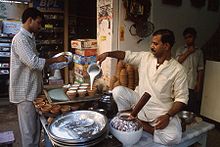Lassi
 Fat-free lassi | |
| Place of origin | Indian Subcontinent |
|---|---|
| Region or state | North India and Punjab, Pakistan |
| Main ingredients | Yogurt, cream, water, spices, fruit |
Lassi (pronounced [ləs-siː]) (La'See) is a popular, traditional, yogurt-based drink from the Indian Subcontinent and is popular in India, Pakistan, Nepal, Sri Lanka and Bangladesh. Lassi is a blend of yogurt, water, spices and sometimes, fruit. Traditional lassi (a.k.a., "salted lassi", or simply, "lassi") is a savoury drink, sometimes flavoured with ground and roasted cumin. Sweet lassi, however, contains sugar or fruits, instead of spices. Salted mint lassi is highly favoured in Bangladesh
In Dharmic religions, yogurt sweetened with honey is used while performing religious rituals. Less common is lassi served with milk and topped with a thin layer of clotted cream. Lassis are enjoyed chilled as a hot-weather refreshment, mostly taken with lunch. With a little turmeric powder mixed in, it is also used as a folk remedy for gastroenteritis.
Variations
Traditional mild sweet (or salty) lassi




This form of lassi is more common in North India and Punjab provinces of Pakistan. It is prepared by blending yogurt with water and adding sugar and other spices to taste. Salt can be substituted in place of sugar. The resulting beverage is known as salted lassi. This is similar to ayran or doogh.
Sweet lassi
Sweet lassi is a form of lassi flavoured with sugar, rosewater and/or lemon, strawberry or other fruit juices. Saffron lassis, which are particularly rich, are a specialty of Rajasthan and Gujarat in India and Sindh in Pakistan. Makkhaniya lassi is simply lassi with lumps of butter in it (makkhan is the Gujarati, Hindi and Punjabi word for butter). It is usually creamy like a milkshake.
Mango lassi
Mango lassi is gaining popularity worldwide. It is made from yogurt, water and mango pulp. It may be made with or without additional sugar. It is widely available in UK, Malaysia, Singapore, the United States, and in many other parts of the world. In various parts of Canada, mango lassi is a cold drink consisting of sweetened kesar mango pulp mixed with yogurt, cream, or ice cream. It is served in a tall glass with a straw, often with ground pistachio nuts sprinkled on top.[1]
Bhang lassi
Bhang (or bhung) lassi is a special lassi that contains bhang, a liquid derivative of cannabis, which has effects similar to other eaten forms of cannabis. It is legal in many parts of India and mainly sold during Holi, when pakoras containing bhang are also sometimes eaten. Uttar Pradesh is known to have licensed bhang shops, and in many places one can buy bhang products and drink bhang lassis.[2]
Chaas
Chaas or chaach is a salted drink like lassi. However, chaas contains more water than lassi and has the butterfat removed, so its consistency is not as thick as lassi. Salt and jeera (cumin seeds) are normally added for taste and sometimes even fresh coriander. Fresh ground ginger and green chillies may also be added as seasoning. Chaas is popular in the Indian states Gujarat and Rajasthan, where it is drunk with the main meal, and was known to aid digestion[3] and is an excellent coolant in the Indian and Pakistani summers .[citation needed] It is called majjige in Kannada, taak in Marathi, majjiga in Telugu, moru in Tamil and Malayalam, mahi in the Madheshi languages, and ghol in Bengali.
Cultural references
A 2008 print[4] and television[5][6] ad campaign for HSBC, written by Jeffree Benet of JWT Hong Kong, tells a tale of a Polish washing machine manufacturer's representative sent to India to discover why their sales are so high there. On arriving, the representative investigates a lassi parlor, where he is warmly welcomed, and finds several washing machines being used to mix it. The owner tells him he is able to "make ten times as much lassi as I used to!"
On his No Reservations television program, celebrity chef Anthony Bourdain visited a "Government Authorised" Bhang Shop in Jaisalmer Fort, Rajasthan. The proprietor offered him three varieties of bhang lassi: "normally strong, super duper strong, and full power 24 hour, no toilet, no shower."
In 2013, Kshitij, the annual techno-management fest of IIT Kharagpur, has launched a campaign to name next version of Android, Lassi.[7]
See also
- Ayran
- Cacık
- Chaas
- Dahi
- Doogh
- Kumis
- List of Indian beverages
- List of yogurt-based dishes and beverages
References
- ^ Wayne Collins (1970-01-01). "Food - Recipes : Mango lassi cocktail". BBC. Retrieved 2014-01-08.
- ^ Anthony Bourdain: No Reservations Collection 2, Episode 5; Final Segment.
- ^ "Cool curds". The Hindu. September 27, 2013. Retrieved 9 February 2014.
- ^ "Can This Lassi Ad Really Be True?". indiablogs.searchindia.com. 2008-10-04.
- ^ "HSBC Bank : Washing Machine and Lassi". Adoholik. 2008-09-27. Retrieved 2008-10-19.
- ^ "HSBC Lassi/Washing Machines TV Ad". HSBC. 2012-04-30. Retrieved 2013-09-23.
- ^ TOI Tech Sep 11, 2013, 06.56PM IST (2013-09-11). "IIT grads plead Google to name Android version Lassi - Times Of India". Articles.timesofindia.indiatimes.com. Retrieved 2014-01-08.
{{cite web}}: CS1 maint: multiple names: authors list (link) CS1 maint: numeric names: authors list (link)
External links
- "Anthony Bourdain's No Reservations Travel Guides - Highlights From Rajasthan". Retrieved 2008-01-19.
- Mango Lassi Recipe
